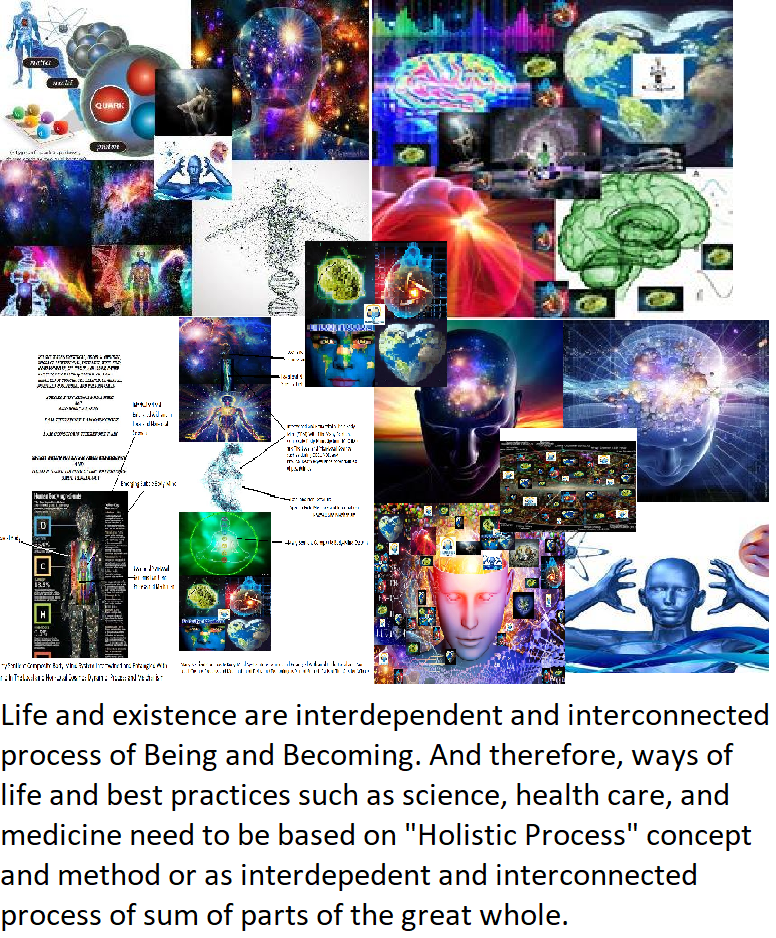|
|
LOCAL AND NON-LOCAL
This brief and simplified discernment is to complement the following well presented analyses and wisdom https://www.youtube.com/watch?v=Wq2eukYfRoA. And to help clarify and resolve the core philosophical differences between Buddhism and Advaita Vedanta (and equivalent Hinduism philosophy):
Basically, in Hinduism, the philosophy that all are interconnected is expressed mainly through the content and context of "Indra Net", "Interdependent and Interconnectedness of all things", and "Oneness of Wholeness". While, in Buddhism, they are expressed through philosophy of "Dependent and Interdependent Origination", "Dependent and Interdependent Arising", and "Oneness of Wholeness". And therefore, self (Atman) and no-self (AnAtman) philosophy in Buddhism does not mean there is no subtle body-mind or real self. Rather, there is real self (Atman) just as in Hinduism Advaita Vedanta philosophy. However, the self has no intrinsic inherent independent existence (i.e. exists as part of sum of parts of the greater whole) at the whole level. And therefore, Buddhism philosophy of self (Atman) and no-self (AnAtman) implies that the self does exist at the individual level, but at the higher or relative-absolute-ultimate-eternal reality or irreducible truth, is not separated or independent from the greater whole. Another way of stating is transformation and evolution in the known physical world. And beyond are individual and collective self-realization and self-actualization or self-realization and self-actualization as parts of sum of parts of the greater whole. And which are why nature elements and species have their spectra-field as parts of the cosmic unified spectra-field. And as clearly indicated through life and evolution in the solar system and on earth from RNA-DNA to organisms to cells to multi-cells to primitive species to more evolved species to tribes to communities to societies and civilizations. And despite resolution could have been achieved through scholar, spiritual, and common and greater good reasons and convictions; has been causes of malpractice, confusion, disagreement, discord, and conflict; and therefore, harm, injustice, and suffering over the millenniums. However, they are more often due to causalities of tribalism, identity politics, influences, divisiveness, and dominance or status quo imposed or created by emperors and or warlords of those days (since it is well known or empirical based that emperors and or warlords dictated social emancipation, development, living, and practices) rather than wanted perpetuated in fighting among spiritual traditions and supporter, follower, and practitioner. Furthermore, the terms self (Atman) and non-self (AnAtman) philosophy have to be used together as non-dual irreducible content and context rather than separately or as separated distinct words. Using together, would mean self exists at the part level and no-self at the greater whole level as just mentioned. While using them separately would lead to contradiction and paradox. And therefore, illusion and delusion which, as already mentioned, lead to malpractice, conflict, harm, injustice, and suffering. The main reasons for Buddhism and Hinduism schisms or conflicts or literally in fighting over the millenniums were not only due to content and context pluralism or life and existence experience; rather also due to identification with content and context. And therefore, by non identification and non grasping, one can recognize or realize that core philosophy of Buddhism and Advaita Vedanta are basically more or less similar as had inspired and encouraged in a few diverse past discernments (since after all, much of Buddhism wisdom were derived from Jainism and Hinduism. And much of Advaita Vedanta wisdom were derived from Buddhism and Hinduism). And therefore, there should be unity and harmony among traditions (and denominations and lineages) rather than reasons for schisms, discords, divisiveness, and conflict which would be due to such as social-cultural-economical-civil-political, tribalism, and false self identity politics. And content and context or beliefs grasping rather than due to differences since they are basically equivalent at the core or main philosophical level. Furthermore, the senses of such as good will, goodness, and faith based on the human potential or essence and nature of being or of being and becoming, should have transcended falsely perceived and or experienced differences. A simple way of saying is should be based on common ground of being. And of nature rather than on differences or the many aspects of diversity and pluralism essential for manifestation of infinite potentialities of possibilities of parts of sum of parts of the greater whole. And which are reasons for why the greater whole is far greater than sum of it parts which allow the parts in turn to have infinite potentialities of possibilities (i.e. circular interdependent and interconnectedness or intertwinement and entanglement process of being and becoming of parts of sum of parts of the greater whole). Another way of saying is what have just been discerned here (and more profound or beyond) could have been realized through diligent and skillful practiced of 8 Noble Path. And therefore, supporter, follower, and practitioner of Buddhism and Advaita Vedanta are inspired, encouraged, and urged to heartfully and mindfully practice the 8 Noble Path. Updated 10/18/2020: "Knowing" or self-evidential empirical experience from direct experience (whether objective and or subjective (direct objective experience)) which, if not for all, then for almost all can be far more relatable, and therefore affirming, than objective empirical data. This is now a better known conditions and experience of the human spy. And as reviewed in a recent analysis https://iai.tv/articles/why-evidence-wont-change-your-convictions-auid-1648. Updated 10/16/2020 |
Author
Initiative of Epistemology of Life and Ontology of Existence Foundation and Institute Archives
July 2024
Categories
Additional and previous Blog can be found at: |

 RSS Feed
RSS Feed
